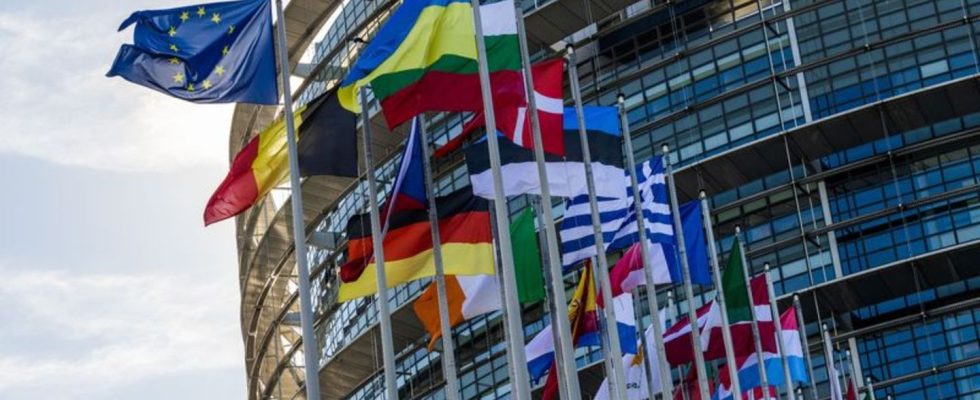Answers to the European elections
How much power does the EU Parliament have?
The flags of the European Union, Ukraine and the EU member states in front of the European Parliament building in Strasbourg. photo
© Philipp von Ditfurth/dpa
There will be elections in Europe in just under 50 days. Hundreds of millions of EU citizens can then cast their votes and thus have a decisive influence on EU policy for five years.
Just under seven weeks until European elections – but what exactly will be voted on at the beginning of June – and what not? What influence does the European Parliament have? An overview:
When will the European elections take place?
Votes can be cast from June 6th to 9th – on a different day depending on the country. It starts with the Dutch, who can go to the polls on Thursday, June 6th. This is followed by Ireland, followed by Latvia, Malta and Slovakia the next day. In the rest of the EU, like in Germany, elections will take place on Sunday, June 9th. The different dates are intended to allow different electoral traditions to be maintained in the countries. In the Federal Republic, as in federal elections, polling stations are open from 8 a.m. to 6 p.m.
Who vote?
For the first time in Germany, minors are allowed to vote in European elections. The voting age was reduced from 18 to 16 years. This means that the number of eligible voters has increased from around 61.5 million in 2019 to almost 65 million people for the upcoming election.
Germany is one of the few countries where minors are allowed to take part in the election. According to information from the EU Parliament in August, this is otherwise only possible in Austria, Belgium, Malta and Greece. The voting age in Greece is 17. In total, there are almost 360 million eligible voters living in the EU.
Germans who do not live in Germany and want to take part in the election must submit a formal application for entry in the voters’ register before each election. According to the Federal Returning Officer, there are different procedures depending on which country you live in.
Who will be elected?
720 representatives are elected. In terms of the sheer number, there are fewer politicians than in the last election, when 751 people’s representatives entered parliament. When Great Britain left the EU, numerous MPs also lost their mandate. Compared to the current number of MPs, 15 more places will be allocated.
How are MPs distributed across the states?
Germany is the country with the most eligible voters and, as the most populous country in the EU, also has the most representatives. However, Germans are still underrepresented in parliament. While a German MP represents an average of 875,000 people based on the total population, a MP from Malta only represents just under 100,000. If this inequality did not exist, the parliament would either have to become significantly larger or the citizens of the smallest EU countries would only be represented by one MP.
How is voting done?
This differs from EU country to EU country, sometimes from party to party. In Germany, most parties draw up nationwide lists, the order of which is determined at a party conference. The more votes a party gets, the more people from that list move in. In the case of the CDU/CSU, lists are not adopted nationwide, but at the state level. It is uniform across the EU that the number of representatives of a party must be proportional to the number of votes received. There are no cross-country lists.
What are the implications of the election?
Which majorities can be organized in parliament has a decisive influence on new EU laws. Many current projects, such as the phase-out of combustion engines or controversial nature conservation and climate laws, had to be approved by a majority in parliament. Parliament also has a major influence on the distribution of money, such as the billions in EU agricultural funding.
However, most laws are negotiated together with the EU states and must also find a majority in the so-called Council. Representatives of the respective national governments decide there. The European elections have no direct influence on the majority in this institution.
However, the composition of the EU Commission after the election can influence Parliament. The authority has the sole right to propose specific EU legal acts, which are then negotiated by Parliament and the EU states. Although it is initially the task of the heads of state and government to make a proposal for the president, Parliament can reject this. As a rule, a candidate from the ranks of the largest parliamentary group is also proposed.
The Council and the President-elect will then draw up a list of the remaining commissioners, one from each EU state. Parliament must also approve the appointment of the remaining commissioners.
What national characteristics are there?
In Germany, as in the Netherlands, there is no barrier clause. This means that as soon as a party gets around one percentage point, it can expect a seat in parliament. In the Netherlands it takes just under 3.25 percent for a seat. Other countries, however, have a threshold clause. In France, for example, a party must receive at least five percent of the vote; in Austria it is four percent. In addition, voting is formally compulsory in some EU countries. This is the case in Belgium, Luxembourg and Greece, for example.

